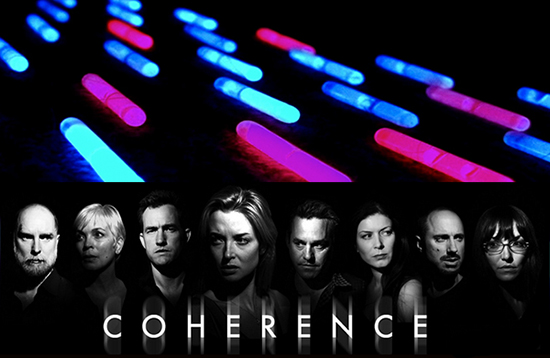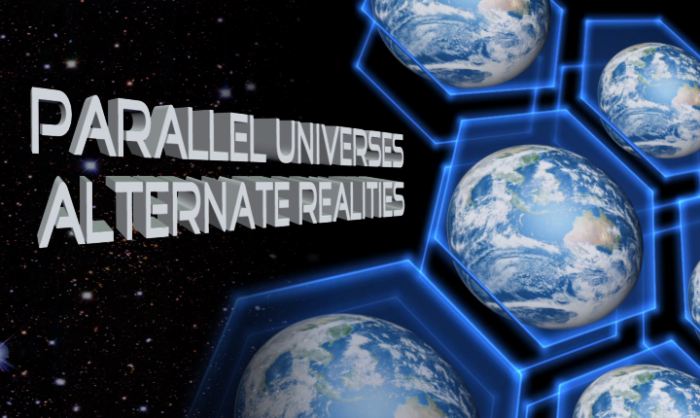The Way It Should Be
One lazy evening a while back, I was scrolling through the movies on Amazon Prime and came across an indie film called Coherence. A quick search on Google pulled up favorable reviews, so I gave it a shot. I’m glad I did, and I think you’ll enjoy it too. It’s technically a sci-fi film but there are no special effects or futuristic technology. In fact, the entire film happens in and around a house. Without giving too much away, an ordinary dinner party fractures into alternate realities and it’s hard to know who belongs where. The ending will make you say “Whoa!” Keanu Reeves-style.
The concept of alternate realities and infinite quantum possibilities has been around for a while, in theoretical physics and in science fiction. I’ve even written about the topic before on Speculative Faith. The entertainment possibilities are endless (pardon the pun). A key difference between parallel universes and time travel is that a character moves back and forth in time travel and side-to-side in parallel universes (and sometimes both). In the realm of science, quantum physics assumes that parallel universes are in fact real and possibly even reachable, if we had a near-infinite amount of energy at our disposal.
One of the reasons why parallel universe and alternate reality stories are so tantalizing is because of the inherent human tendency to be dissatisfied with this reality. There is not a person alive who would not change something if they could. On a large scale, everyone wishes they could change something in history (buy Hitler’s paintings and thereby encourage him to continue his career in art instead of genocide). On a personal level, everyone has moments in their life that they wish they could go back and change. Some points are of crucial importance, while others are just boneheaded moments of embarrassment. Who among us hasn’t wondered if there is a happier, “better” version of ourselves in another universe?
This is all fun and games but when this kind of thinking grips our mind and conscience, it is unproductive and potentially damaging on a number of levels. First of all, regret is a waste of emotional energy. “Man, I wish I had/hadn’t…” is an exercise in futility. Time is a river that only flows one way, and we cannot change what has happened. We can only affect what will happen in the future. Secondly, if there were other versions of us out there, knowing (or even imagining) that they were happier than we are in our reality would have no bearing on our present situation. “At least one of us is having a great time” would likely only deepen our discontentment.
The most important reason to be content with this for-better-or-worse life is God’s sovereignty. He is the absolute ruler of all creation (Col. 1:15-20) and everything happens because He wills it or lets it. Essentially, this reality is the way it is because this is how God glorifies Himself (Rom. 11:36). The Bible also promises that everything works together for good if we are in Christ (Rom. 8:28). If we say to God, “Why am I…? Why did You…? Why couldn’t they…?” we are telling God that we have a better idea of our life than He does. When we do that, we aren’t thinking of God’s glory; we are thinking of our selfish desires.
The truth is that there is only one reality, and this reality is such that glorifies God in the best way possible. Every good thing comes from God and every bad thing comes from sin. Wishing things were different is contrary to what Scripture teaches. Instead, we are instructed to be content with our circumstances, because we are given the strength to endure (Phil. 4:11-13). So even if there were other Marks out there, their earthly happiness would be irrelevant. The only thing that matters is the glory of God, and He is making that happen right here, right now.






























Hm…if there were alternate realities, God would probably be in charge of those too, and their existence would probably glorify him as well. God isn’t so fragile that he can’t handle an alternate reality where someone chooses a different job or marries a different person or didn’t say this one little thing they always regretted.
That said, there are some potential moral issues with chasing time travel and alternate realities. Even if we used it to go back in time and get rid of dictators and whatnot, some results would be bad. Sure, maybe certain genocides wouldn’t happen, but some of the people that exist today are alive because of past tragedies or whatnot. Like, maybe a lot of couples only met because some tragic thing brought them together, so removing that tragedy would mean creating circumstances that would eliminate a lot of people alive today. So, basically, removing one genocide would basically make another. The only difference is that the time travel induced genocide would likely go unnoticed/be painless.
And when I think about time travel in the sense of reliving my life again and making different choices, or an alternate reality where things were ‘ideal’…I don’t know. I think about how that could set me on a different path that could make things far worse for me further down the road. Like, maybe if I’d continued going to this one other college I liked, who’s to say I wouldn’t have gotten into a car wreck and died or something? An alternate reality or time travel could fix one little issue we were fretting over, but it’s naive to assume it couldn’t lead to more misery or regrets later.
That said, sometimes dwelling on regrets and whatifs can be a good motivator for keeping ourselves from making the same mistakes in the future. Such things are perfectly alright as long as we don’t let them consume our whole life or pull us into bad decisions.
That’s thoughtful.
Provocative question: What if we’re all just a dream God’s having?
I’ve thought about that, and there’s a lot of implications. Either way, we have to make our own choices (even if it is all a dream) and the consequences of those choices still feel very real to us and God holds us accountable for them. Buuuut, if it is all God’s dream, he’s very lucky for being able to dream so vividly and choose what he dreams about 😛
Obviously, though, there’s no way to know if this is all a dream or not, so we pretty much should/need to treat it as real regardless.
Alternate realities? Hmmm.
There’s a book I read years ago, it won the Christy in 2003 (?) in what’s now called Visionary. Ever read Nancy Moser’s Time Lottery? They find a way to change the past … or do they, really?
(Just checked; it’s listed in the Lorehaven library)